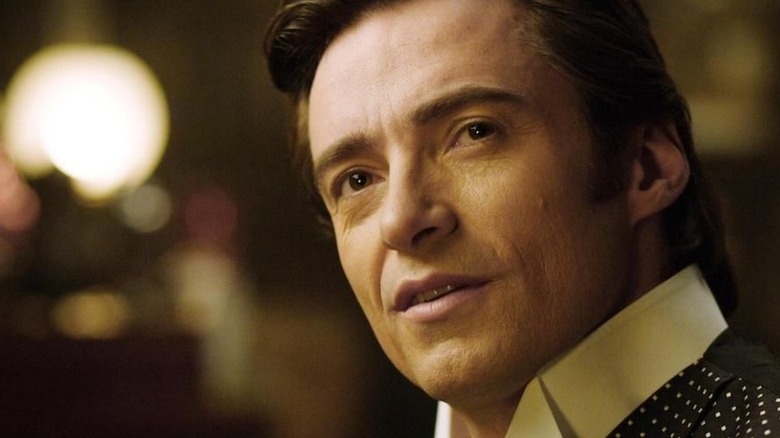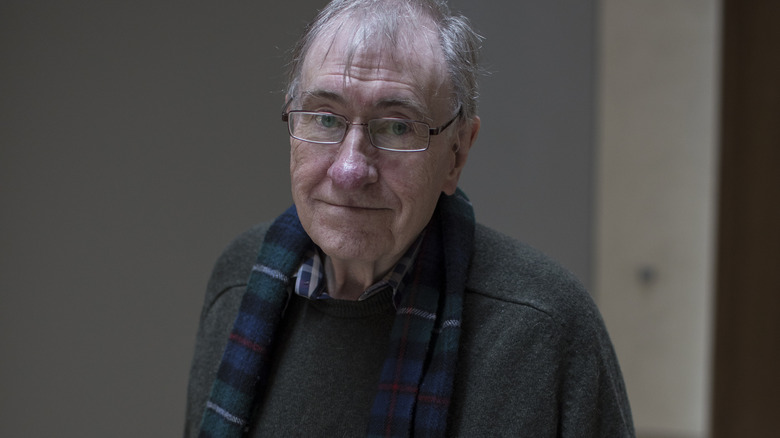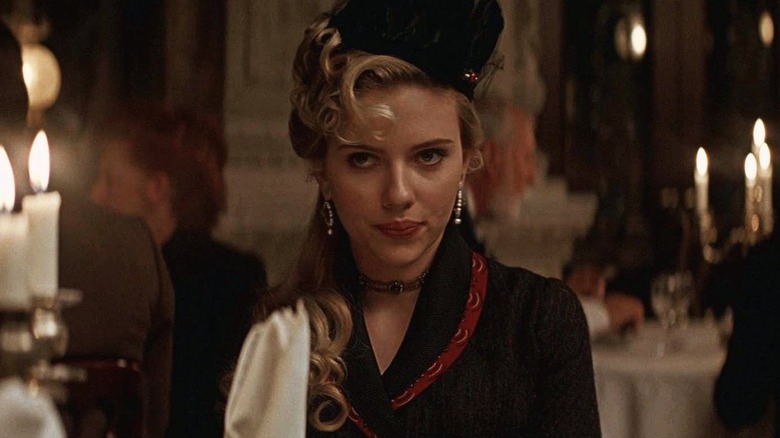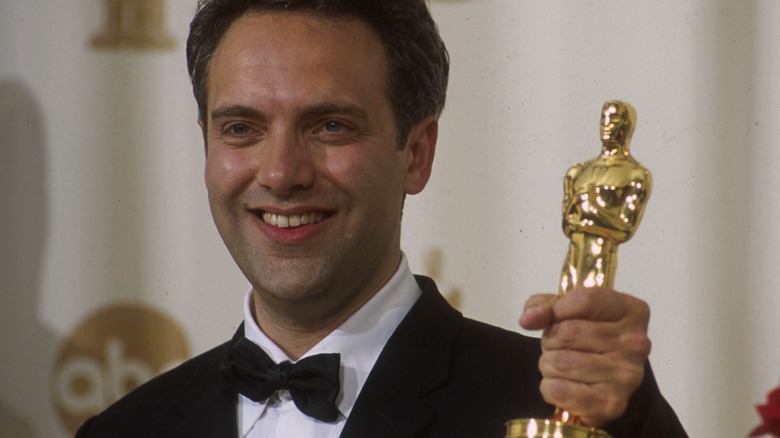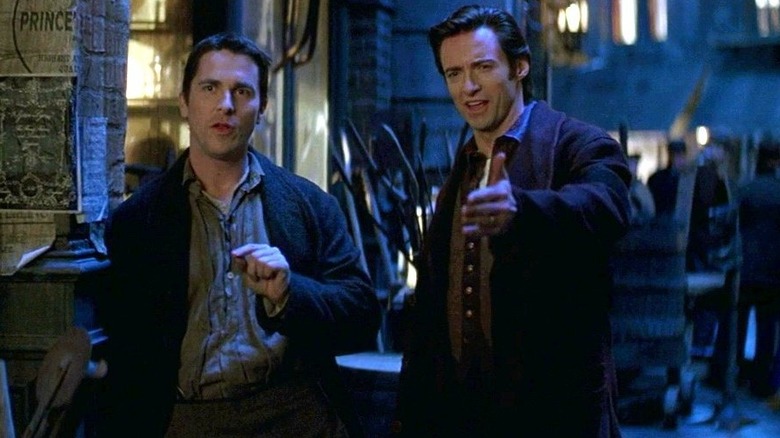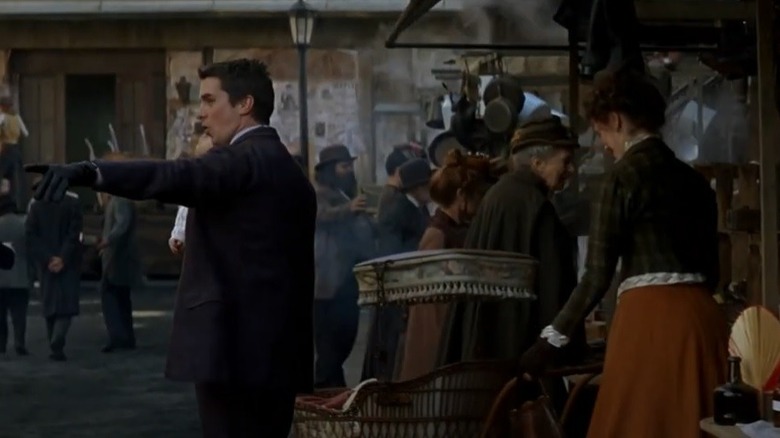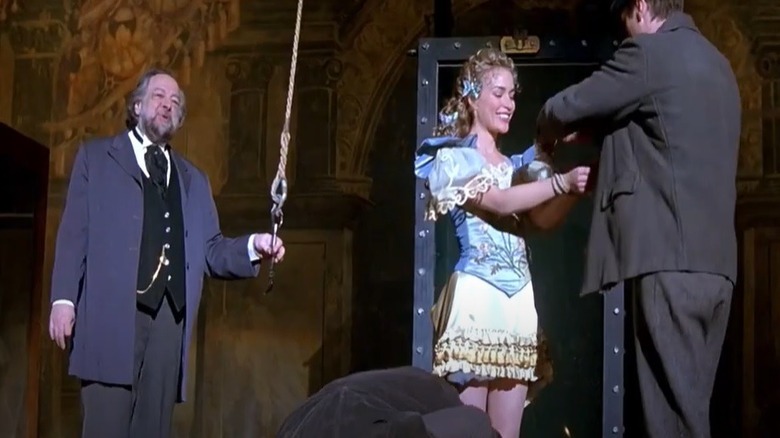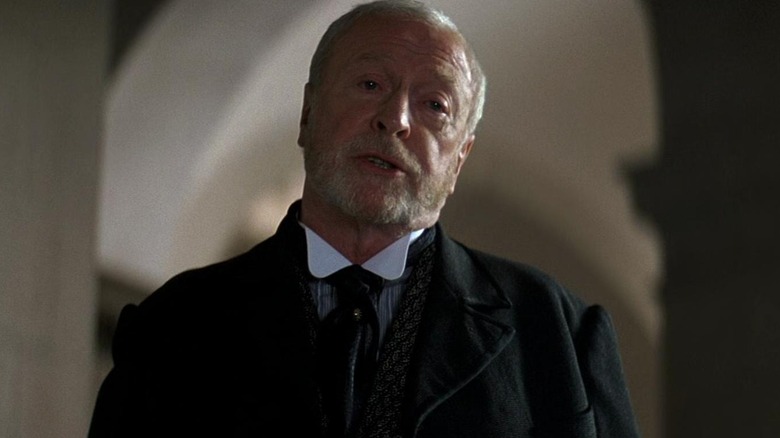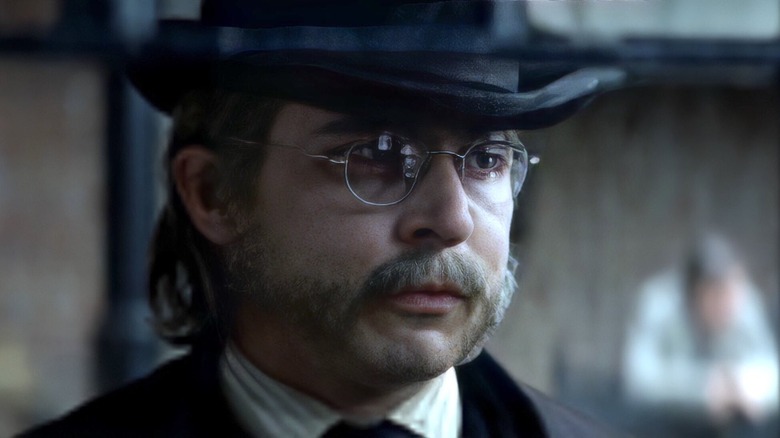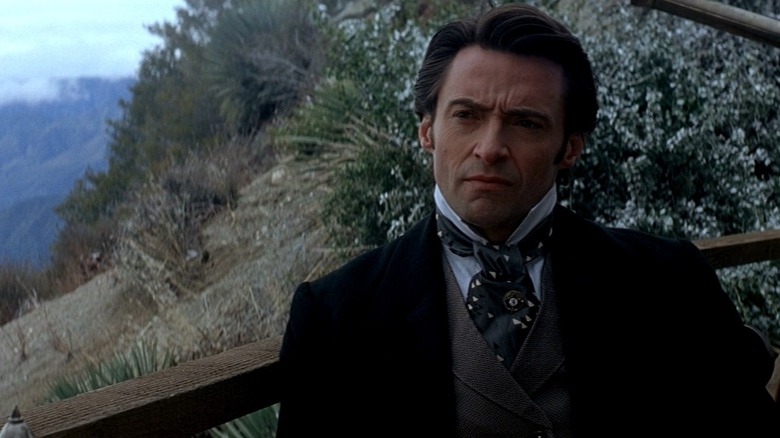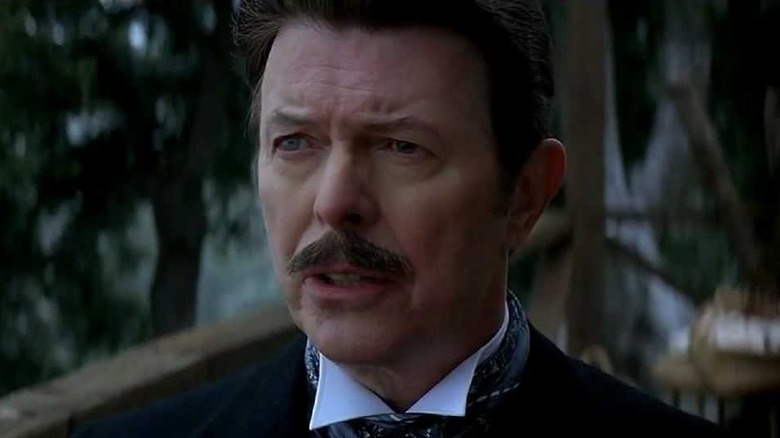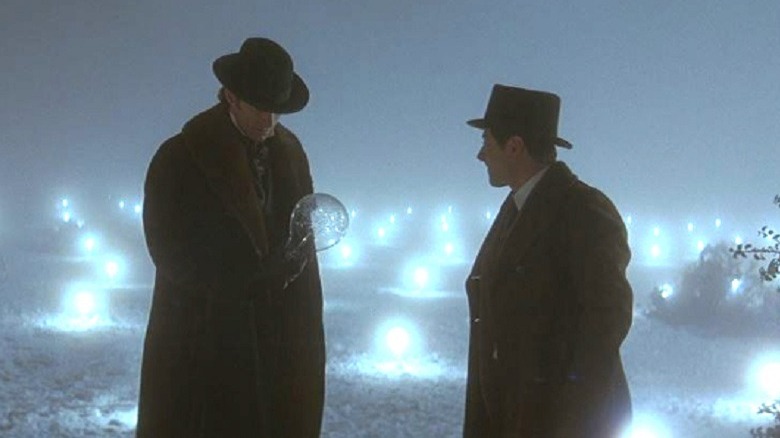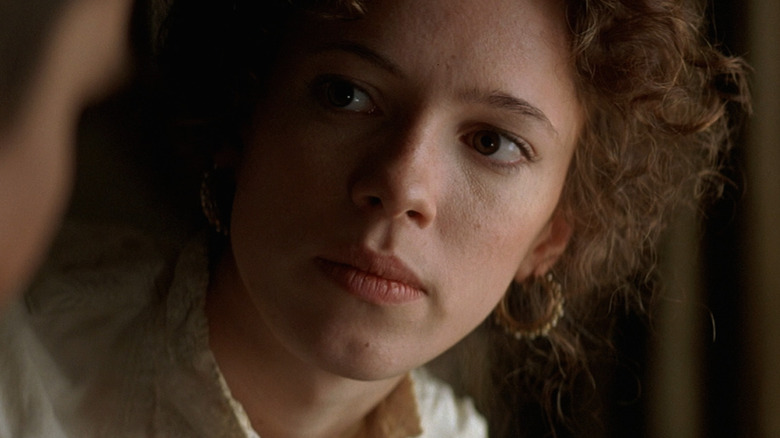The Prestige: How Christopher Nolan Achieved Movie Magic
Though "Memento" definitely got him on the radar of critics and indie film fans, it wasn't until "Batman Begins" that the public at large first took notice of filmmaker Christopher Nolan. While he was helping to legitimatize the medium of comic book and superhero movies as serious dramas — not to mention bringing the Dark Knight back from the movie purgatory that "Batman & Robin" had sent the character and his universe to years earlier — Nolan also proved that he wasn't going to be a one-trick or even one-franchise pony as he continued to make other films in between installments of his "Batman" trilogy.
One such movie was "The Prestige," the 2006 historical thriller that he directed and co-wrote with his brother, Jonathan. The movie stars Hugh Jackman and Christian Bale as previously friendly magicians in the 1890s who are driven apart by a tragic event that transforms them into bitter rivals. Like many Nolan movies, "The Prestige" follows a non-linear plot structure that sees events frequently jumping backwards and forwards in time, with major twists that make you want to immediately watch the movie again to see how differently everything looks once you know the various secrets.
Perhaps the biggest mystery in the film is whether legitimate magic is at play, or if everything you see is nothing more than an illusion. One thing is for sure: Nolan definitely created bona fide movie magic with "The Prestige." Read on to see what was behind all the smoke and mirrors.
It is based on an award-winning fantasy novel
After his first two feature-length films — "Following" and "Memento" — were either original ideas or based on a story by his brother Jonathan, Christopher Nolan first took a crack at fully adapting someone else's novel with his 2002 crime thriller "Insomnia." It may not be one of his more commonly remembered films in retrospect, but it was very well received at the time of its release and showed that Nolan could do just as well with adaptations as with original ideas. It also happens to be a fantastic showcase for the dramatic acting chops of Robin Williams, in one of his rare turns as a villain.
Between "Insomnia" and how well he adapted the world of Batman to the big screen, Nolan felt plenty emboldened to do his own take on the acclaimed 1995 fantasy novel "The Prestige" by author Christopher Priest. Like the movie, the novel is about two feuding magicians in late 19th century England, and it already contained the film's set up of being told through the diaries of the main characters looking back on the events that are detailed in the story. The novel earned rave reviews and won both a James Tait Black Memorial Prize and a World Fantasy Award.
The screenplay took five years to complete
Most Christopher Nolan movies have layer upon layer of depth, are packed with twists and surprises, and are dense with details that can only fully be appreciated upon multiple viewings. "The Prestige" is very much in that same tradition, and its multitude of secrets and near-constant time jumps make it perhaps his most structurally complex film — even more so than the chronologically reversed "Memento." In other words, it's not the kind of movie that can be written in a weekend.
In fact, Nolan told The London Paper that he and his brother Jonathan took an astonishing five years to write the script for "The Prestige." The movie was in pre-production for so long that Nolan originally meant to do it before "Batman Begins," but production on that movie ended up getting underway first and put "The Prestige" between his first two "Batman" movies instead. Much of that writing time came in the way of trying to figure out how to get the book condensed into a single film since, as Nolan put it, "The novel has got enough material for 10 different movies."
Sam Mendes was the original choice to direct
Even though it was adapted from someone else's book, "The Prestige" just feels like a Christopher Nolan story, and it's hard to think of any other filmmaker tackling it. That's the mark of a great director and a well-executed adaptation, though — watching a movie and not being able to picture it in the hands of anyone else. So it might come as a twist worthy of his own movies that he actually wasn't the first director in mind to adapt Christopher Priest's novel.
As Priest told France-based film culture outlet Skript, both Sam Mendes and Christopher Nolan were being considered to adapt "The Prestige." Priest and Mendes spoke literally the same day that "American Beauty" was announced to have been nominated for seven Academy Awards — including a Best Director nod for Mendes himself, which he eventually won — so Priest felt privileged to have such a talented filmmaker fresh off a highly decorated film interested in doing a movie based on his book.
When Nolan and his wife/producing partner Emma Thomas got word that Priest was considering Mendes instead of him, Priest was contacted and asked to hold off until a motorcycle arrived at his house with a VHS copy of Nolan's film "Following." It got there, Priest watched it, and he decided to go with Nolan instead.
It wasn't a given that Christian Bale be in the film
After having starred in "Batman Begins" and already tapped for at least one sequel at the time by way of the then-upcoming "The Dark Knight," it was easy to assume that Christopher Nolan always had Christian Bale in mind to play Alfred Borden in "The Prestige." On top of that, Nolan already had already established a tradition of working with a recurring troupe of actors — see Michael Caine, Thomas Lennon, Nicky Katt, Larry Holden, and Mark Boone Jr. — so no one would've been surprised to see his "Batman" lead back for "The Prestige."
Interestingly, not only was Bale not the first choice from the beginning, but he had to be the one to reach out to Nolan and request the part. As Nolan explained to IGN, Hugh Jackman was contacted first and was given the choice of which of the two lead roles he wanted to play. He ultimately picked Robert Angier, leaving Alfred Borden to be cast. Nolan said that he was then contacted out of the blue by Bale, with the actor having already read the script — which he obtained on his own — and insisted he play Borden.
Looking back, Nolan admits that Bale was the obvious choice and that it's now impossible to imagine anyone else in the role.
The set designers transformed Los Angeles into Victorian England
"The Prestige" mostly takes place in Victorian England, with a few jaunts to Colorado for the Nikola Tesla scenes. While things obviously had to be decorated in such a way to mirror the time period, what is perhaps most impressive is that the whole of the movie was actually filmed on location in Los Angeles. In fact, everything was done in existing locations and already-built sound stages, with one exception.
As explained in the book "Focus On: 100 Most Popular Films Based on British Novels," only a single set was constructed specifically for "The Prestige" — the area underneath the stage that shows the various levers, pulleys, and gears that make the more elaborate illusions work. Beyond that, every location in the film was shot on either a re-dressed L.A. sound stage, or in some other location in the city. In the aforementioned book, it was also revealed that even the movie's Colorado scenes were filmed in L.A., with the parking lot of the city's Mount Wilson Observatory standing in for the foggy, lightbulb-strewn field around Tesla's compound.
Real magicians consulted on the production -- and one cameoed in the film
Hugh Jackman and Christian Bale are both extremely talented actors, and have each proven so across numerous films and performances. Still, there's a certain set of skills required to be a great stage magician, and even the best actor is going to need a little professional assistance in order to convincingly portray a master illusionist on screen. For "The Prestige," several magicians were consulted to help Jackman and Bale learn how to fool real movie audiences into thinking they were magicians that were fooling their fictional audiences.
One of those magicians was illusionist Derek DelGaudio, best known for his Frank Oz-directed Hulu special "In and Of Itself." He explained to Collider that he was brought in when previous consultants Ricky Jay and Michael Weber were no longer available to continue their work on the film, and he stuck around for the remainder of the production. DelGaudio helped the actors with their stage presence, their sleight of hand, and the various beats that an illusionist goes through over the course of a trick.
As for Ricky Jay, he actually cameoed in the film as Milton the Magician, for whom the two leads are working as assistants at the beginning of the film when things go horribly wrong during an underwater escape trick.
Nolan saw the movie as a metaphor for filmmaking
Considering he made a movie that feels very much like a love letter to stage magic and its fascinating history, and that its story is even structured in the same way as the performance of an illusionist — first comes the pledge, then the turn, and finally, the prestige — it might come as a surprise that Christopher Nolan claimed he had not actually been a stage magic fan before he discovered the source material.
Instead, what drew Nolan to the original book was his feeling that filmmakers and illusionists are both in the business of making magic, and approach that shared artform in similar ways. He went on to explain how the movie taking place in 1890s England is significant to that comparison. "I think there are huge similarities between what magicians did back then and what filmmakers do now," Nolan told Empire. "Just think of their relationship with the audience." Nolan also likened Victorian-era magicians to being like the "filmmakers or even the movie stars or rock stars of their day."
The actors weren't fully told how all the tricks worked
Perhaps the single biggest twist in "The Prestige" comes at the very end, when the horrible truth behind Robert Angier's version of the Transported Man trick is revealed. And many of the illusions seen during the film are explained by way of the audience seeing the characters learn to perform them and then practice them before doing them for an audience. But just because the people watching the movie see the secrets behind the tricks doesn't necessarily mean that the actors knew the secrets while they were shooting.
Hugh Jackman explained to Empire that the magicians that were brought in to help teach the actors the tricks often just told them the performance part of the illusions — where to stand, how to pose, what levers to pull — without fully explaining just how the tricks actually worked. What stage magic relies on more than anything else is secrecy, and each new person who learns a trick to is one less person who can be fooled, and another person who can potentially spill the beans to others. It's a mark of how seriously they take their art that the magicians gave the actors just enough information to play their parts, while still keeping the actual secrets under wraps.
That said, Jackman did say that he learned how to make a small ball disappear, and Bale learned the neat trick of being able to shuffle playing cards with one hand.
Natural lighting was used as often as possible
Although "The Prestige" has many elements of a period piece, Christopher Nolan has frequently dismissed attempts to characterize the movie as such. That's partly because the negative connotations so frequently associated with period pieces — that they're often too long, too slow, and take too long to make. On that last point, Nolan didn't want to spend as long making the movie as is the case for a lot of big, epic Hollywood period pieces — after all, he had an all-time classic superhero movie sequel starring a certain caped crusader battling a certain mentally unstable clown to get to work on.
During IGN's visit to the movie's edit bay, it was revealed that among the ways Nolan streamlined the production of "The Prestige" was to use handheld cameras instead of elaborately-constructed rigs and shots that required hours of prep work. He also opted to use natural lighting as often as possible, rather than relying on artificial means of lighting the scenes, which not only sped up production time significantly but also leant the movie a warmer and more authentic feel.
It's definitely interesting to learn that a movie all about magic actually chose to forgo traditional means of creating movie magic in several key ways.
David Bowie took some convincing to sign on as Nikola Tesla
Best known as one of the most groundbreaking musicians in the history of popular music, David Bowie also had a storied acting career. While he was most prolific in this regard during the 1980s, he would become a lot choosier about his acting roles in the '90s and beyond, no longer willing to do movies and television just for the sake of doing it, and instead preferring to only do projects that inspired or moved him in some way. Among his final acting roles prior to his 2016 death with as inventor Nikola Tesla in "The Prestige" — a role that he almost didn't take.
In an article Christopher Nolan wrote for Entertainment Weekly following Bowie's death as a tribute to the legend, the filmmaker said that Bowie initially turned him down to play Tesla in "The Prestige." Nolan claims it was the only time he ever continued to pursue someone for a part after being rejected, and went on to say he basically begged Bowie to do it. Obviously Bowie eventually agreed, and not surprisingly, he was perfect in the role. Nolan went on to say that Bowie was a wonderful presence on the set and that the experience of collaborating only made him a bigger fan than he already was. The old saying "never meet your heroes" clearly didn't apply to David Bowie.
The lightbulb scene at Tesla's compound was based on real experiments by the inventor
Speaking of Tesla, "The Prestige" definitely treats the inventor and engineer with a great deal of reverence, suggesting he was capable of producing legitimate magic — though through the use of science, of course. While the machine he built for Angier for the Transported Man illusion is the most impressive feat he accomplishes during the film, one of the earliest ways Tesla's brilliance is displayed is by way of being able to illuminate light bulbs via an electrical field in the air rather than needing to directly connect them to anything. In other words, he was already figuring out how to power things wirelessly at a time when even wired electricity was still a relatively new and novel concept.
As it turns out, that particular trick wasn't completely made up for purposes of Hollywood storytelling. In real life, Tesla had indeed successfully figured out several different ways to cause light bulbs to illuminate by way of ambient or proximity-based conduction rather than needing to have them physically plugged into a power source, not entirely unlike how it was portrayed in the film.
Rebecca Hall accidentally ad-libbed a spoiler -- and Nolan kept it in
If there's one thing that doesn't seem like it would mesh well with Christopher Nolan's carefully-constructed stories, it's actors ad-libbing. And yet, "The Prestige" contains an example of an actor ad-libbing that made it into the final cut — despite the fact that the actor who did the improvising was immediately horrified and regretted her decision.
Actor Rebecca Hall — who played Alfred Borden's often-suffering wife, Sarah — improvised the line "I know what you really are" in one of her many frustrated confrontations with her illusionist husband. Of course, once you've seen the entire movie and learn the secret of Alfred having a double who's been interacting with Sarah seemingly unbeknownst to her, you realize that this line is a major hint at that eventual revelation.
Knowing this, Hall was worried she had spoiled the movie when she said the line, and instantly felt terrible about it. However, Nolan loved the line and the various ways the audience might take it at that point in the movie — and that it would only be upon repeat viewings that most people would realize the true implications of it. It made the final cut.
